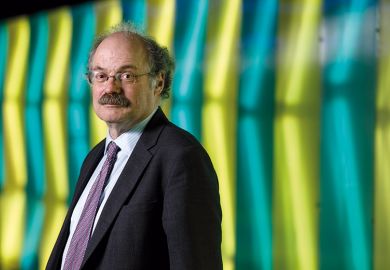I am delighted and honoured to serve as the chief executive designate of UK Research and Innovation. Subject to the passage of the Higher Education and Research Bill through Parliament, UKRI will enable a more strategic approach to one of this country’s greatest national assets.
My task is to work with all stakeholders to ensure that UKRI becomes the best agency in the world for the public funding of research and innovation.
Throughout the bill’s scrutiny, both parliamentarians and the science and innovation community have played a vital role in ensuring that UKRI will effectively deliver this objective. As a result, the government has tabled a package of amendments to the bill that, in my view, bring significant improvements. These amendments also have the support of Sir Paul Nurse, whose 2015 government-commissioned review is the primary driver for the creation of UKRI.
Arguably, the most important of these amendments is enshrining in law the Haldane Principle. This is set out (in Clause 99 of the amended bill) as “the principle that decisions on individual research proposals are best taken following an evaluation of the quality and likely impact of the proposals (such as a peer review process)”.
Many have also welcomed the amendments made to strengthen Innovate UK’s business-facing focus.
But there are also amendments directed towards UKRI governance structures and functions. These will help me in my role and ensure that UKRI is equipped to deliver for – and retain the trust of – the entire UK research and innovation community.
For example, it is clearly a positive development that experience of the charitable sector is now being proposed among the key criteria for appointments to the UKRI board. Having served as the director of the Wellcome Trust for 10 years, I appreciate the sector’s huge contribution to the overall research endeavour.
Equally, I am encouraged that the government has honoured its commitment to establish an executive committee. This will provide an important space in which the executive chairs of each council and I can engage. It removes any doubt that the councils are at the core of UKRI.
Many have called for the government to commit to consulting the community before any future changes are made to the seven research councils. Subject to Parliament, the secretary of state, through UKRI, will now be obliged to consult on any such changes. This is both important and reflects that UKRI must understand the needs of the community and work with it to create the best possible structures.
Importantly, these amendments also clarify the legal objectives of the research councils.
While I have never doubted that the advancement of knowledge would continue to be among their core objectives, it is reassuring that this will be written into law. Furthermore, there are proposals to allow the councils greater freedom in the maximum number of board members they can appoint, and in recruiting specialist employees.
Overall, I believe that these amendments recognise the importance of pluralism and flexibility in our research and innovation system. Together, we are taking the necessary steps now to underpin continued success in a fast-changing world.
Sir Mark Walport is chief executive designate of UKRI (UK Research and Innovation).
Register to continue
Why register?
- Registration is free and only takes a moment
- Once registered, you can read 3 articles a month
- Sign up for our newsletter
Subscribe
Or subscribe for unlimited access to:
- Unlimited access to news, views, insights & reviews
- Digital editions
- Digital access to THE’s university and college rankings analysis
Already registered or a current subscriber?


